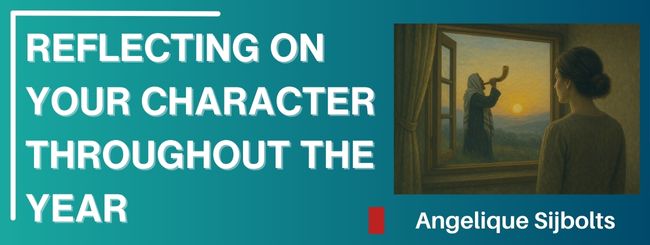בס”ד
There are moments in the Jewish calendar that are especially suited for self-reflection, character development, and realignment with one’s life mission. Chief among them is Rosh Hashanah – the day of judgment for all creation. But Rosh Hashanah is not an isolated event in the fall. Its message echoes throughout the year, reminding us to reflect — during the spring, on our birthday, and even every single day.
Rosh Hashanah – A Day of Judgment and of Creation
The Torah says in Leviticus 23:24
| 24 Speak unto the children of Israel, saying: In the seventh month, in the first day of the month, shall be a solemn rest unto you, a memorial proclaimed with the blast of horns, a holy convocation. | כד דַּבֵּר אֶל-בְּנֵי יִשְׂרָאֵל, לֵאמֹר: בַּחֹדֶשׁ הַשְּׁבִיעִי בְּאֶחָד לַחֹדֶשׁ, יִהְיֶה לָכֶם שַׁבָּתוֹן–זִכְרוֹן תְּרוּעָה, מִקְרָא-קֹדֶשׁ. |
Though months are counted from Nisan (the spring month of the Exodus), the years are counted from Tishrei, marking the creation of Adam (Genesis Rabbah 12:9). Thus, Rosh Hashanah is known as the “Head of the Year” and a day of judgment for all mankind — not just for Israel, but for the world.
As stated in the Mishnah:
“At four times the world is judged: on Passover for grain, on Shavuot for fruits, on Rosh Hashanah all creatures pass before Him like sheep… and on Sukkot for water.”
— Mishnah Rosh Hashanah 1:2
On this day, we are not only judged, but also reminded of our purpose. God created man on Rosh Hashanah, expressing that the world is incomplete without us. But this day also recalls the first sin — the fall of Adam and Eve — and with it, the human need for reflection and repair.
Spring Reminder – The Parsha Reading and the Omer Count
Curiously, Leviticus 23, the passage that introduces Rosh Hashanah, is read in spring during Parashat Emor — even though the holiday occurs in the fall. This coincides with the period of Sefirat HaOmer (Counting the Omer) between Passover and Shavuot.
The Omer count is a time of personal refinement. Each of the 49 days corresponds to a combination of seven emotional attributes (chesed, gevurah, tiferet, netzach, hod, yesod, malchut). The practice of tikkun hamiddot (refinement of character traits) is deeply embedded in this period.
| 15 And ye shall count unto you from the morrow after the day of rest, from the day that ye brought the sheaf of the waving; seven weeks shall there be complete; | טו וּסְפַרְתֶּם לָכֶם, מִמָּחֳרַת הַשַּׁבָּת, מִיּוֹם הֲבִיאֲכֶם, אֶת-עֹמֶר הַתְּנוּפָה: שֶׁבַע שַׁבָּתוֹת, תְּמִימֹת תִּהְיֶינָה. |
Although this is a mitzvah for Jews, non-Jews (Noahides) can also embrace this period as an opportunity for universal ethical growth. Improving character, practicing compassion, and becoming emotionally balanced are not exclusive to any one faith — they are human goals.
Your Birthday – A Personal Rosh Hashanah
Rosh Hashanah is the “birthday” of Adam. That idea invites us to consider our own birthday as a time for introspection.
The day of your birth is the day G-d declared: “The world cannot exist without you.” It’s not just a celebration — it’s a calling. Take a moment to ask: What have I accomplished? What can I improve? Am I fulfilling my unique task in the world?
A beautiful tradition is to read your birthday Psalm: the Psalm number that corresponds to your age + 1.
For example: if you’re turning 24, read Psalm 25.
(The Baal Shem Tov was taught this custom by his teacher, Achiyah Hashiloni (See Sichot Kodesh 5733, vol. 2, p. 9).
Can you receive gifts? Yes.
Cake with candles? Cake is festive and appropriate. But be cautious with candles. The practice of placing candles on birthday cakes originates in Greek pagan tradition, especially in rituals honoring Artemis (see: Encyclopedia of Religion and Ethics). In Judaism, candles symbolize the soul (Proverbs 20:27), and some avoid “blowing out” symbolic souls.
Every Morning – A New Beginning
Every morning is like a small rebirth. In Judaism, the day begins with Modeh Ani, a short but powerful prayer of gratitude:
“I offer thanks to You, living and eternal King, for You have mercifully restored my soul within me; Your faithfulness is great.”
This is suitable not only for Jews but also Noahides who seek to express daily gratitude. If morning is a moment of spiritual awakening, then the day deserves to be closed with reflection.
Every Evening – End the Day in Forgiveness
End your day with the Ribono Shel Olam prayer. It is a nightly practice of forgiveness — for others and for yourself. It clears the heart and prepares the soul for restful sleep:
“Master of the World, I forgive anyone who has angered me, harmed me, whether deliberately or unintentionally, in word or deed…”
The extended version continues with a plea not to repeat sins, and that any correction from G-d be done not through suffering or illness, but through compassion.
“Wipe away the sins I have committed, with Your great compassion, but not through suffering or affliction.”
Conclusion: Let Every Day Be a Mini Rosh Hashanah
Rosh Hashanah calls us to take stock of our lives. But its essence — self-reflection, character growth, and divine awareness — isn’t limited to one day. We hear its echo in:
- the spring reading of the Parsha,
- the Omer count toward Shavuot,
- our birthdays, and
- the daily rhythm of morning thanks and evening forgiveness.
Let’s not wait for the Day of Judgment to judge ourselves. Every day is a new chance to return to who we are meant to be.
By Angelique Sijbolts
With thanks to Rabbi Tani Burton for his feedback
Source of inspiration
See also:
WHAT CAN NOAHIDES LEARN FROM “THE OMER”?
© Copyright, all rights reserved. If you enjoyed this article, we encourage you to distribute it further.
Our blogs may contain text/quotes/references/links that include copyright material of Mechon-Mamre.org, Aish.com, Sefaria.org, Chabad.org, and/or AskNoah.org, which we use in accordance with their policies.
